Comprehensive Report on Business Ethics: Issues and Recommendations
VerifiedAdded on 2020/02/05
|8
|2091
|78
Report
AI Summary
This report provides an overview of business ethics, examining key issues such as diversity, compliance, and governance. It highlights the importance of ethical codes of conduct in the global business environment, discussing the impact of cultural diversity in the workplace and the need for effective strategies to manage it. The report also explores compliance issues, emphasizing the importance of adhering to government regulations and the role of HR management in training employees. Furthermore, it addresses governance issues, focusing on corporate governance, internal audits, and the role of the board of directors in ensuring ethical practices. The report concludes by emphasizing the importance of integrating ethical considerations into all aspects of business operations to achieve organizational goals and maintain a positive business environment. The report uses various sources such as books, journals, and online resources to support the arguments.
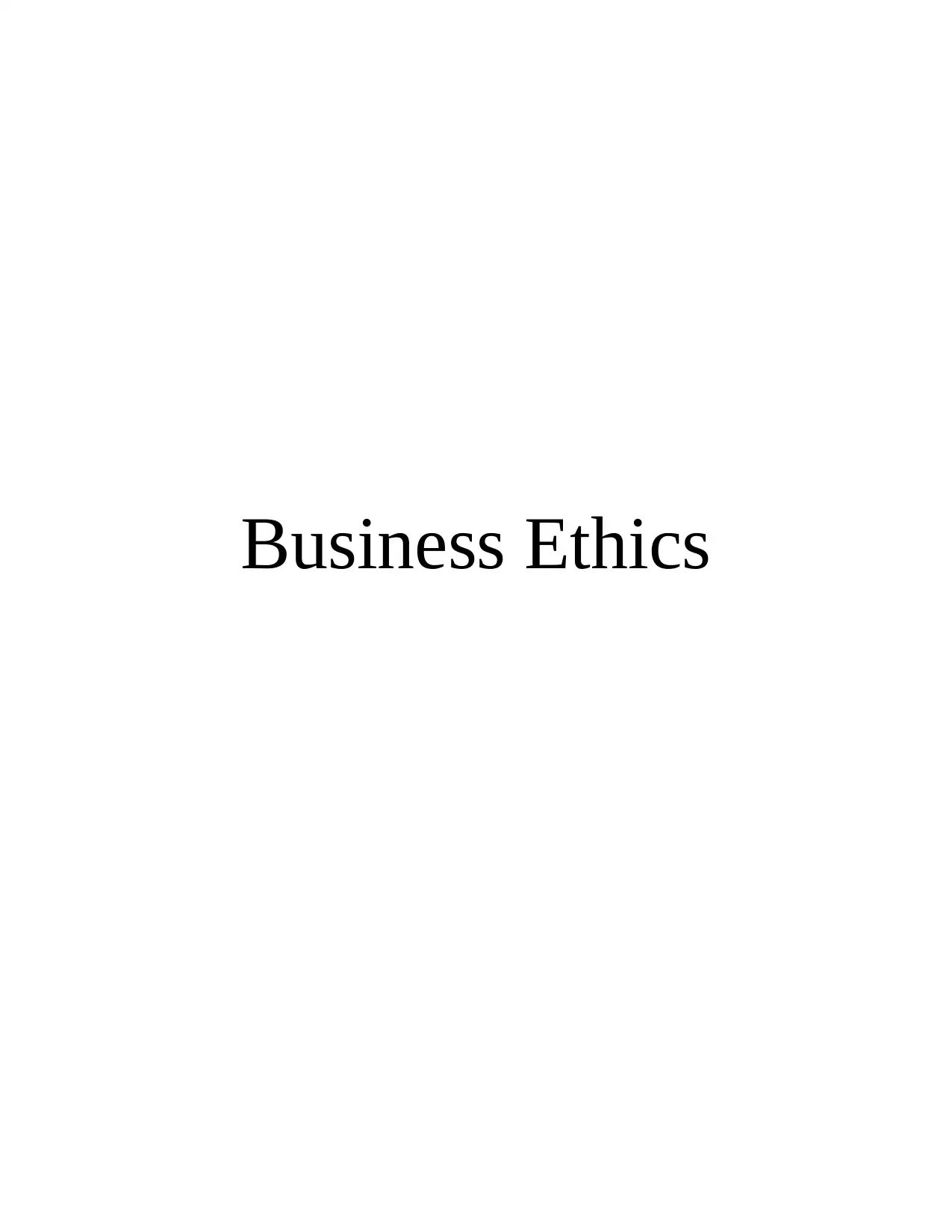
Business Ethics
Paraphrase This Document
Need a fresh take? Get an instant paraphrase of this document with our AI Paraphraser
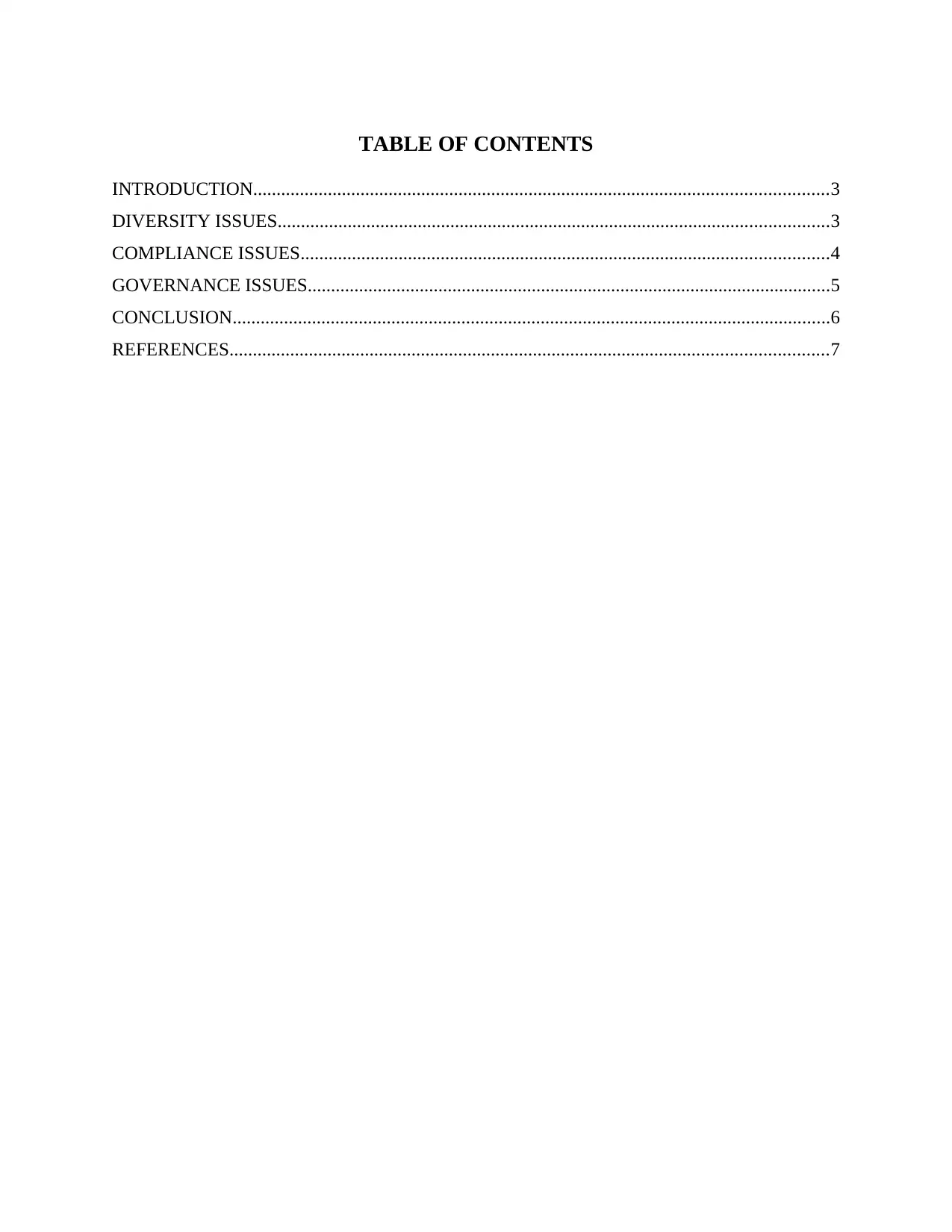
TABLE OF CONTENTS
INTRODUCTION...........................................................................................................................3
DIVERSITY ISSUES......................................................................................................................3
COMPLIANCE ISSUES.................................................................................................................4
GOVERNANCE ISSUES................................................................................................................5
CONCLUSION................................................................................................................................6
REFERENCES................................................................................................................................7
INTRODUCTION...........................................................................................................................3
DIVERSITY ISSUES......................................................................................................................3
COMPLIANCE ISSUES.................................................................................................................4
GOVERNANCE ISSUES................................................................................................................5
CONCLUSION................................................................................................................................6
REFERENCES................................................................................................................................7
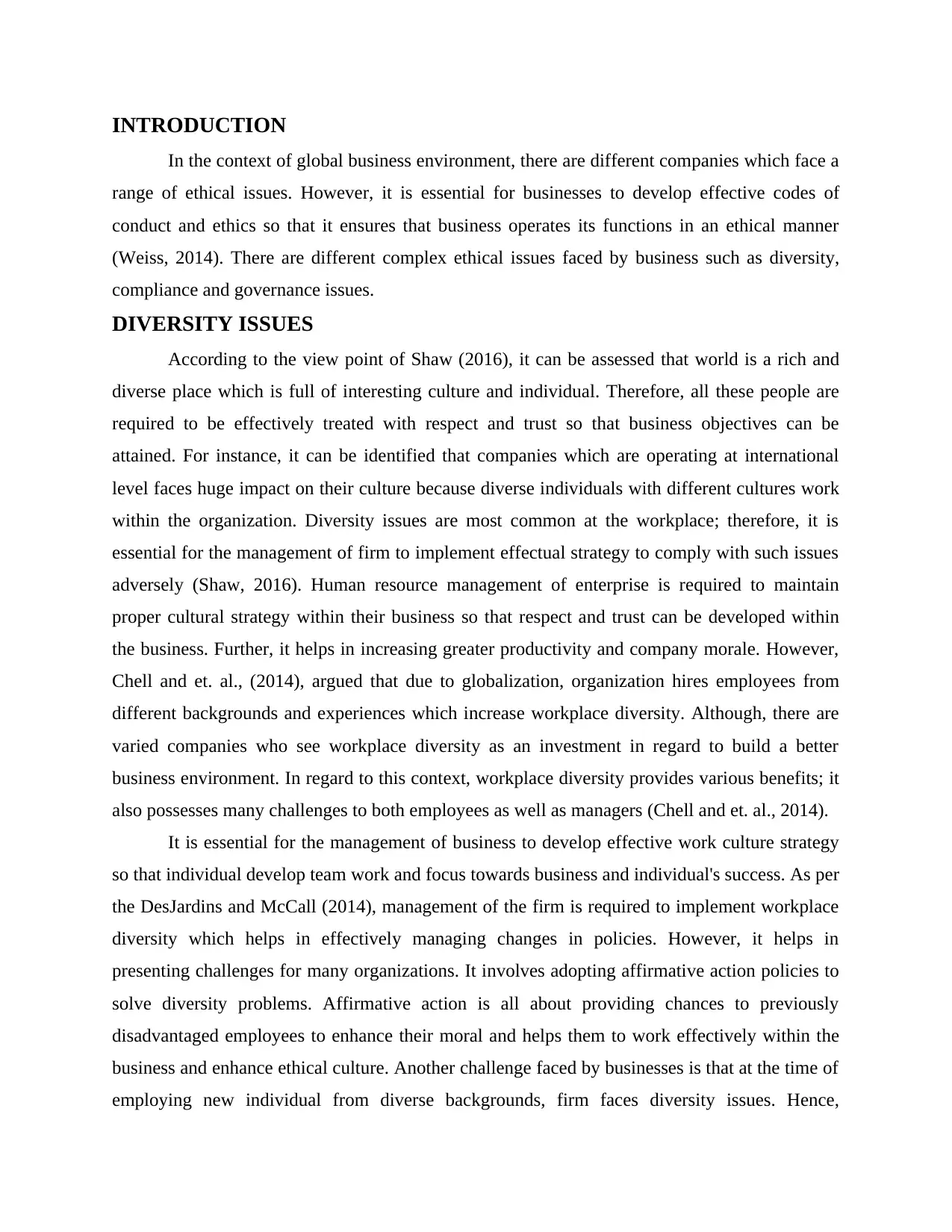
INTRODUCTION
In the context of global business environment, there are different companies which face a
range of ethical issues. However, it is essential for businesses to develop effective codes of
conduct and ethics so that it ensures that business operates its functions in an ethical manner
(Weiss, 2014). There are different complex ethical issues faced by business such as diversity,
compliance and governance issues.
DIVERSITY ISSUES
According to the view point of Shaw (2016), it can be assessed that world is a rich and
diverse place which is full of interesting culture and individual. Therefore, all these people are
required to be effectively treated with respect and trust so that business objectives can be
attained. For instance, it can be identified that companies which are operating at international
level faces huge impact on their culture because diverse individuals with different cultures work
within the organization. Diversity issues are most common at the workplace; therefore, it is
essential for the management of firm to implement effectual strategy to comply with such issues
adversely (Shaw, 2016). Human resource management of enterprise is required to maintain
proper cultural strategy within their business so that respect and trust can be developed within
the business. Further, it helps in increasing greater productivity and company morale. However,
Chell and et. al., (2014), argued that due to globalization, organization hires employees from
different backgrounds and experiences which increase workplace diversity. Although, there are
varied companies who see workplace diversity as an investment in regard to build a better
business environment. In regard to this context, workplace diversity provides various benefits; it
also possesses many challenges to both employees as well as managers (Chell and et. al., 2014).
It is essential for the management of business to develop effective work culture strategy
so that individual develop team work and focus towards business and individual's success. As per
the DesJardins and McCall (2014), management of the firm is required to implement workplace
diversity which helps in effectively managing changes in policies. However, it helps in
presenting challenges for many organizations. It involves adopting affirmative action policies to
solve diversity problems. Affirmative action is all about providing chances to previously
disadvantaged employees to enhance their moral and helps them to work effectively within the
business and enhance ethical culture. Another challenge faced by businesses is that at the time of
employing new individual from diverse backgrounds, firm faces diversity issues. Hence,
In the context of global business environment, there are different companies which face a
range of ethical issues. However, it is essential for businesses to develop effective codes of
conduct and ethics so that it ensures that business operates its functions in an ethical manner
(Weiss, 2014). There are different complex ethical issues faced by business such as diversity,
compliance and governance issues.
DIVERSITY ISSUES
According to the view point of Shaw (2016), it can be assessed that world is a rich and
diverse place which is full of interesting culture and individual. Therefore, all these people are
required to be effectively treated with respect and trust so that business objectives can be
attained. For instance, it can be identified that companies which are operating at international
level faces huge impact on their culture because diverse individuals with different cultures work
within the organization. Diversity issues are most common at the workplace; therefore, it is
essential for the management of firm to implement effectual strategy to comply with such issues
adversely (Shaw, 2016). Human resource management of enterprise is required to maintain
proper cultural strategy within their business so that respect and trust can be developed within
the business. Further, it helps in increasing greater productivity and company morale. However,
Chell and et. al., (2014), argued that due to globalization, organization hires employees from
different backgrounds and experiences which increase workplace diversity. Although, there are
varied companies who see workplace diversity as an investment in regard to build a better
business environment. In regard to this context, workplace diversity provides various benefits; it
also possesses many challenges to both employees as well as managers (Chell and et. al., 2014).
It is essential for the management of business to develop effective work culture strategy
so that individual develop team work and focus towards business and individual's success. As per
the DesJardins and McCall (2014), management of the firm is required to implement workplace
diversity which helps in effectively managing changes in policies. However, it helps in
presenting challenges for many organizations. It involves adopting affirmative action policies to
solve diversity problems. Affirmative action is all about providing chances to previously
disadvantaged employees to enhance their moral and helps them to work effectively within the
business and enhance ethical culture. Another challenge faced by businesses is that at the time of
employing new individual from diverse backgrounds, firm faces diversity issues. Hence,
⊘ This is a preview!⊘
Do you want full access?
Subscribe today to unlock all pages.

Trusted by 1+ million students worldwide
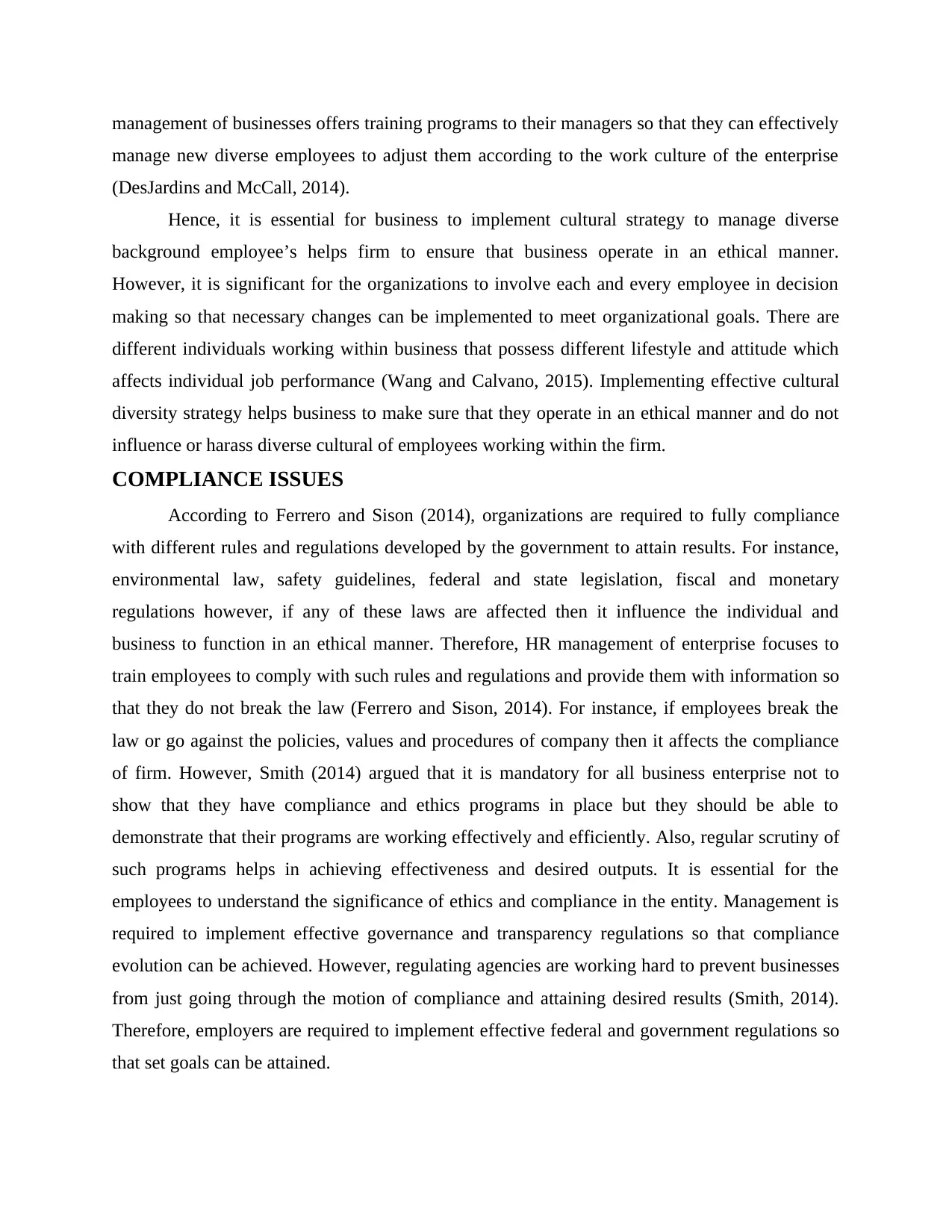
management of businesses offers training programs to their managers so that they can effectively
manage new diverse employees to adjust them according to the work culture of the enterprise
(DesJardins and McCall, 2014).
Hence, it is essential for business to implement cultural strategy to manage diverse
background employee’s helps firm to ensure that business operate in an ethical manner.
However, it is significant for the organizations to involve each and every employee in decision
making so that necessary changes can be implemented to meet organizational goals. There are
different individuals working within business that possess different lifestyle and attitude which
affects individual job performance (Wang and Calvano, 2015). Implementing effective cultural
diversity strategy helps business to make sure that they operate in an ethical manner and do not
influence or harass diverse cultural of employees working within the firm.
COMPLIANCE ISSUES
According to Ferrero and Sison (2014), organizations are required to fully compliance
with different rules and regulations developed by the government to attain results. For instance,
environmental law, safety guidelines, federal and state legislation, fiscal and monetary
regulations however, if any of these laws are affected then it influence the individual and
business to function in an ethical manner. Therefore, HR management of enterprise focuses to
train employees to comply with such rules and regulations and provide them with information so
that they do not break the law (Ferrero and Sison, 2014). For instance, if employees break the
law or go against the policies, values and procedures of company then it affects the compliance
of firm. However, Smith (2014) argued that it is mandatory for all business enterprise not to
show that they have compliance and ethics programs in place but they should be able to
demonstrate that their programs are working effectively and efficiently. Also, regular scrutiny of
such programs helps in achieving effectiveness and desired outputs. It is essential for the
employees to understand the significance of ethics and compliance in the entity. Management is
required to implement effective governance and transparency regulations so that compliance
evolution can be achieved. However, regulating agencies are working hard to prevent businesses
from just going through the motion of compliance and attaining desired results (Smith, 2014).
Therefore, employers are required to implement effective federal and government regulations so
that set goals can be attained.
manage new diverse employees to adjust them according to the work culture of the enterprise
(DesJardins and McCall, 2014).
Hence, it is essential for business to implement cultural strategy to manage diverse
background employee’s helps firm to ensure that business operate in an ethical manner.
However, it is significant for the organizations to involve each and every employee in decision
making so that necessary changes can be implemented to meet organizational goals. There are
different individuals working within business that possess different lifestyle and attitude which
affects individual job performance (Wang and Calvano, 2015). Implementing effective cultural
diversity strategy helps business to make sure that they operate in an ethical manner and do not
influence or harass diverse cultural of employees working within the firm.
COMPLIANCE ISSUES
According to Ferrero and Sison (2014), organizations are required to fully compliance
with different rules and regulations developed by the government to attain results. For instance,
environmental law, safety guidelines, federal and state legislation, fiscal and monetary
regulations however, if any of these laws are affected then it influence the individual and
business to function in an ethical manner. Therefore, HR management of enterprise focuses to
train employees to comply with such rules and regulations and provide them with information so
that they do not break the law (Ferrero and Sison, 2014). For instance, if employees break the
law or go against the policies, values and procedures of company then it affects the compliance
of firm. However, Smith (2014) argued that it is mandatory for all business enterprise not to
show that they have compliance and ethics programs in place but they should be able to
demonstrate that their programs are working effectively and efficiently. Also, regular scrutiny of
such programs helps in achieving effectiveness and desired outputs. It is essential for the
employees to understand the significance of ethics and compliance in the entity. Management is
required to implement effective governance and transparency regulations so that compliance
evolution can be achieved. However, regulating agencies are working hard to prevent businesses
from just going through the motion of compliance and attaining desired results (Smith, 2014).
Therefore, employers are required to implement effective federal and government regulations so
that set goals can be attained.
Paraphrase This Document
Need a fresh take? Get an instant paraphrase of this document with our AI Paraphraser
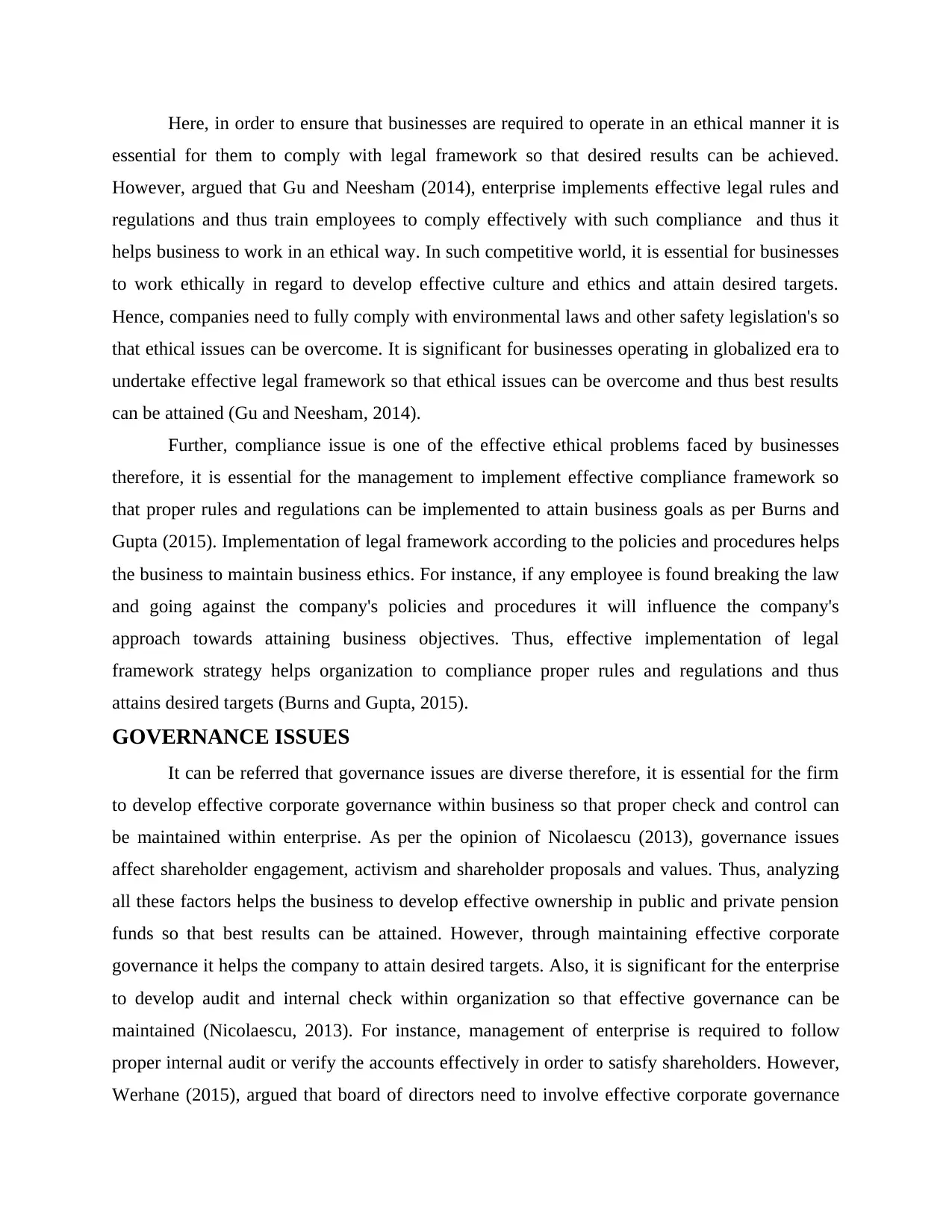
Here, in order to ensure that businesses are required to operate in an ethical manner it is
essential for them to comply with legal framework so that desired results can be achieved.
However, argued that Gu and Neesham (2014), enterprise implements effective legal rules and
regulations and thus train employees to comply effectively with such compliance and thus it
helps business to work in an ethical way. In such competitive world, it is essential for businesses
to work ethically in regard to develop effective culture and ethics and attain desired targets.
Hence, companies need to fully comply with environmental laws and other safety legislation's so
that ethical issues can be overcome. It is significant for businesses operating in globalized era to
undertake effective legal framework so that ethical issues can be overcome and thus best results
can be attained (Gu and Neesham, 2014).
Further, compliance issue is one of the effective ethical problems faced by businesses
therefore, it is essential for the management to implement effective compliance framework so
that proper rules and regulations can be implemented to attain business goals as per Burns and
Gupta (2015). Implementation of legal framework according to the policies and procedures helps
the business to maintain business ethics. For instance, if any employee is found breaking the law
and going against the company's policies and procedures it will influence the company's
approach towards attaining business objectives. Thus, effective implementation of legal
framework strategy helps organization to compliance proper rules and regulations and thus
attains desired targets (Burns and Gupta, 2015).
GOVERNANCE ISSUES
It can be referred that governance issues are diverse therefore, it is essential for the firm
to develop effective corporate governance within business so that proper check and control can
be maintained within enterprise. As per the opinion of Nicolaescu (2013), governance issues
affect shareholder engagement, activism and shareholder proposals and values. Thus, analyzing
all these factors helps the business to develop effective ownership in public and private pension
funds so that best results can be attained. However, through maintaining effective corporate
governance it helps the company to attain desired targets. Also, it is significant for the enterprise
to develop audit and internal check within organization so that effective governance can be
maintained (Nicolaescu, 2013). For instance, management of enterprise is required to follow
proper internal audit or verify the accounts effectively in order to satisfy shareholders. However,
Werhane (2015), argued that board of directors need to involve effective corporate governance
essential for them to comply with legal framework so that desired results can be achieved.
However, argued that Gu and Neesham (2014), enterprise implements effective legal rules and
regulations and thus train employees to comply effectively with such compliance and thus it
helps business to work in an ethical way. In such competitive world, it is essential for businesses
to work ethically in regard to develop effective culture and ethics and attain desired targets.
Hence, companies need to fully comply with environmental laws and other safety legislation's so
that ethical issues can be overcome. It is significant for businesses operating in globalized era to
undertake effective legal framework so that ethical issues can be overcome and thus best results
can be attained (Gu and Neesham, 2014).
Further, compliance issue is one of the effective ethical problems faced by businesses
therefore, it is essential for the management to implement effective compliance framework so
that proper rules and regulations can be implemented to attain business goals as per Burns and
Gupta (2015). Implementation of legal framework according to the policies and procedures helps
the business to maintain business ethics. For instance, if any employee is found breaking the law
and going against the company's policies and procedures it will influence the company's
approach towards attaining business objectives. Thus, effective implementation of legal
framework strategy helps organization to compliance proper rules and regulations and thus
attains desired targets (Burns and Gupta, 2015).
GOVERNANCE ISSUES
It can be referred that governance issues are diverse therefore, it is essential for the firm
to develop effective corporate governance within business so that proper check and control can
be maintained within enterprise. As per the opinion of Nicolaescu (2013), governance issues
affect shareholder engagement, activism and shareholder proposals and values. Thus, analyzing
all these factors helps the business to develop effective ownership in public and private pension
funds so that best results can be attained. However, through maintaining effective corporate
governance it helps the company to attain desired targets. Also, it is significant for the enterprise
to develop audit and internal check within organization so that effective governance can be
maintained (Nicolaescu, 2013). For instance, management of enterprise is required to follow
proper internal audit or verify the accounts effectively in order to satisfy shareholders. However,
Werhane (2015), argued that board of directors need to involve effective corporate governance
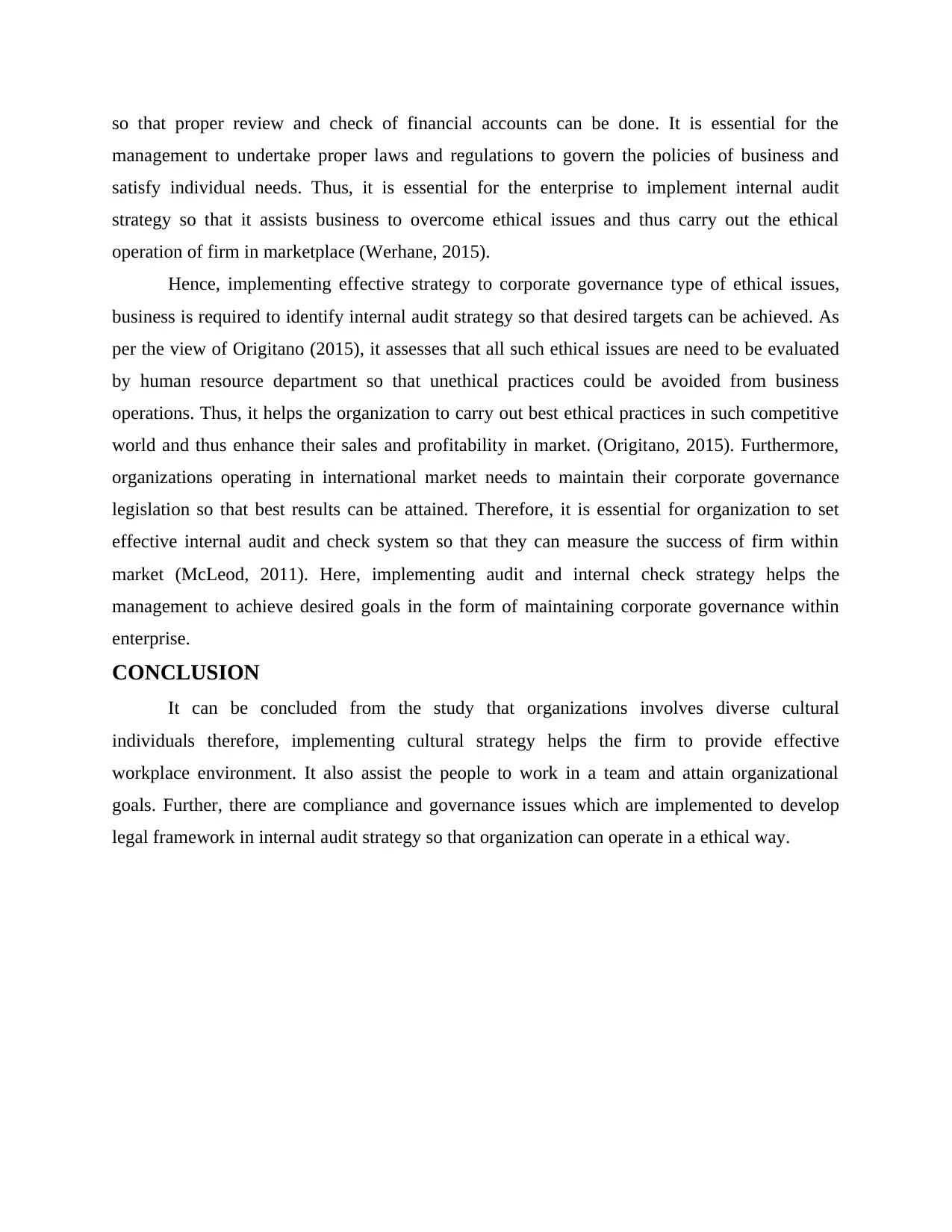
so that proper review and check of financial accounts can be done. It is essential for the
management to undertake proper laws and regulations to govern the policies of business and
satisfy individual needs. Thus, it is essential for the enterprise to implement internal audit
strategy so that it assists business to overcome ethical issues and thus carry out the ethical
operation of firm in marketplace (Werhane, 2015).
Hence, implementing effective strategy to corporate governance type of ethical issues,
business is required to identify internal audit strategy so that desired targets can be achieved. As
per the view of Origitano (2015), it assesses that all such ethical issues are need to be evaluated
by human resource department so that unethical practices could be avoided from business
operations. Thus, it helps the organization to carry out best ethical practices in such competitive
world and thus enhance their sales and profitability in market. (Origitano, 2015). Furthermore,
organizations operating in international market needs to maintain their corporate governance
legislation so that best results can be attained. Therefore, it is essential for organization to set
effective internal audit and check system so that they can measure the success of firm within
market (McLeod, 2011). Here, implementing audit and internal check strategy helps the
management to achieve desired goals in the form of maintaining corporate governance within
enterprise.
CONCLUSION
It can be concluded from the study that organizations involves diverse cultural
individuals therefore, implementing cultural strategy helps the firm to provide effective
workplace environment. It also assist the people to work in a team and attain organizational
goals. Further, there are compliance and governance issues which are implemented to develop
legal framework in internal audit strategy so that organization can operate in a ethical way.
management to undertake proper laws and regulations to govern the policies of business and
satisfy individual needs. Thus, it is essential for the enterprise to implement internal audit
strategy so that it assists business to overcome ethical issues and thus carry out the ethical
operation of firm in marketplace (Werhane, 2015).
Hence, implementing effective strategy to corporate governance type of ethical issues,
business is required to identify internal audit strategy so that desired targets can be achieved. As
per the view of Origitano (2015), it assesses that all such ethical issues are need to be evaluated
by human resource department so that unethical practices could be avoided from business
operations. Thus, it helps the organization to carry out best ethical practices in such competitive
world and thus enhance their sales and profitability in market. (Origitano, 2015). Furthermore,
organizations operating in international market needs to maintain their corporate governance
legislation so that best results can be attained. Therefore, it is essential for organization to set
effective internal audit and check system so that they can measure the success of firm within
market (McLeod, 2011). Here, implementing audit and internal check strategy helps the
management to achieve desired goals in the form of maintaining corporate governance within
enterprise.
CONCLUSION
It can be concluded from the study that organizations involves diverse cultural
individuals therefore, implementing cultural strategy helps the firm to provide effective
workplace environment. It also assist the people to work in a team and attain organizational
goals. Further, there are compliance and governance issues which are implemented to develop
legal framework in internal audit strategy so that organization can operate in a ethical way.
⊘ This is a preview!⊘
Do you want full access?
Subscribe today to unlock all pages.

Trusted by 1+ million students worldwide
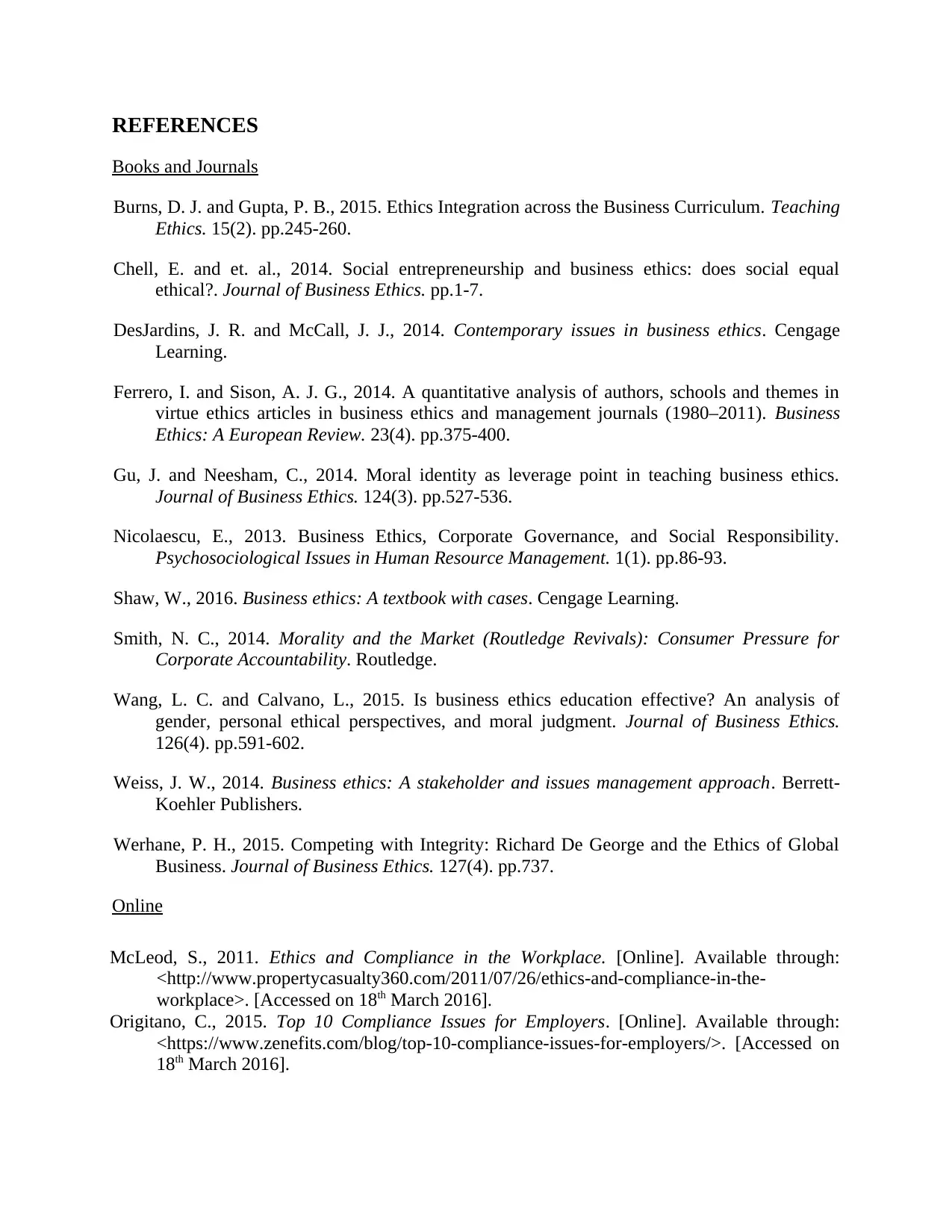
REFERENCES
Books and Journals
Burns, D. J. and Gupta, P. B., 2015. Ethics Integration across the Business Curriculum. Teaching
Ethics. 15(2). pp.245-260.
Chell, E. and et. al., 2014. Social entrepreneurship and business ethics: does social equal
ethical?. Journal of Business Ethics. pp.1-7.
DesJardins, J. R. and McCall, J. J., 2014. Contemporary issues in business ethics. Cengage
Learning.
Ferrero, I. and Sison, A. J. G., 2014. A quantitative analysis of authors, schools and themes in
virtue ethics articles in business ethics and management journals (1980–2011). Business
Ethics: A European Review. 23(4). pp.375-400.
Gu, J. and Neesham, C., 2014. Moral identity as leverage point in teaching business ethics.
Journal of Business Ethics. 124(3). pp.527-536.
Nicolaescu, E., 2013. Business Ethics, Corporate Governance, and Social Responsibility.
Psychosociological Issues in Human Resource Management. 1(1). pp.86-93.
Shaw, W., 2016. Business ethics: A textbook with cases. Cengage Learning.
Smith, N. C., 2014. Morality and the Market (Routledge Revivals): Consumer Pressure for
Corporate Accountability. Routledge.
Wang, L. C. and Calvano, L., 2015. Is business ethics education effective? An analysis of
gender, personal ethical perspectives, and moral judgment. Journal of Business Ethics.
126(4). pp.591-602.
Weiss, J. W., 2014. Business ethics: A stakeholder and issues management approach. Berrett-
Koehler Publishers.
Werhane, P. H., 2015. Competing with Integrity: Richard De George and the Ethics of Global
Business. Journal of Business Ethics. 127(4). pp.737.
Online
McLeod, S., 2011. Ethics and Compliance in the Workplace. [Online]. Available through:
<http://www.propertycasualty360.com/2011/07/26/ethics-and-compliance-in-the-
workplace>. [Accessed on 18th March 2016].
Origitano, C., 2015. Top 10 Compliance Issues for Employers. [Online]. Available through:
<https://www.zenefits.com/blog/top-10-compliance-issues-for-employers/>. [Accessed on
18th March 2016].
Books and Journals
Burns, D. J. and Gupta, P. B., 2015. Ethics Integration across the Business Curriculum. Teaching
Ethics. 15(2). pp.245-260.
Chell, E. and et. al., 2014. Social entrepreneurship and business ethics: does social equal
ethical?. Journal of Business Ethics. pp.1-7.
DesJardins, J. R. and McCall, J. J., 2014. Contemporary issues in business ethics. Cengage
Learning.
Ferrero, I. and Sison, A. J. G., 2014. A quantitative analysis of authors, schools and themes in
virtue ethics articles in business ethics and management journals (1980–2011). Business
Ethics: A European Review. 23(4). pp.375-400.
Gu, J. and Neesham, C., 2014. Moral identity as leverage point in teaching business ethics.
Journal of Business Ethics. 124(3). pp.527-536.
Nicolaescu, E., 2013. Business Ethics, Corporate Governance, and Social Responsibility.
Psychosociological Issues in Human Resource Management. 1(1). pp.86-93.
Shaw, W., 2016. Business ethics: A textbook with cases. Cengage Learning.
Smith, N. C., 2014. Morality and the Market (Routledge Revivals): Consumer Pressure for
Corporate Accountability. Routledge.
Wang, L. C. and Calvano, L., 2015. Is business ethics education effective? An analysis of
gender, personal ethical perspectives, and moral judgment. Journal of Business Ethics.
126(4). pp.591-602.
Weiss, J. W., 2014. Business ethics: A stakeholder and issues management approach. Berrett-
Koehler Publishers.
Werhane, P. H., 2015. Competing with Integrity: Richard De George and the Ethics of Global
Business. Journal of Business Ethics. 127(4). pp.737.
Online
McLeod, S., 2011. Ethics and Compliance in the Workplace. [Online]. Available through:
<http://www.propertycasualty360.com/2011/07/26/ethics-and-compliance-in-the-
workplace>. [Accessed on 18th March 2016].
Origitano, C., 2015. Top 10 Compliance Issues for Employers. [Online]. Available through:
<https://www.zenefits.com/blog/top-10-compliance-issues-for-employers/>. [Accessed on
18th March 2016].
Paraphrase This Document
Need a fresh take? Get an instant paraphrase of this document with our AI Paraphraser

1 out of 8
Related Documents
Your All-in-One AI-Powered Toolkit for Academic Success.
+13062052269
info@desklib.com
Available 24*7 on WhatsApp / Email
![[object Object]](/_next/static/media/star-bottom.7253800d.svg)
Unlock your academic potential
Copyright © 2020–2026 A2Z Services. All Rights Reserved. Developed and managed by ZUCOL.





